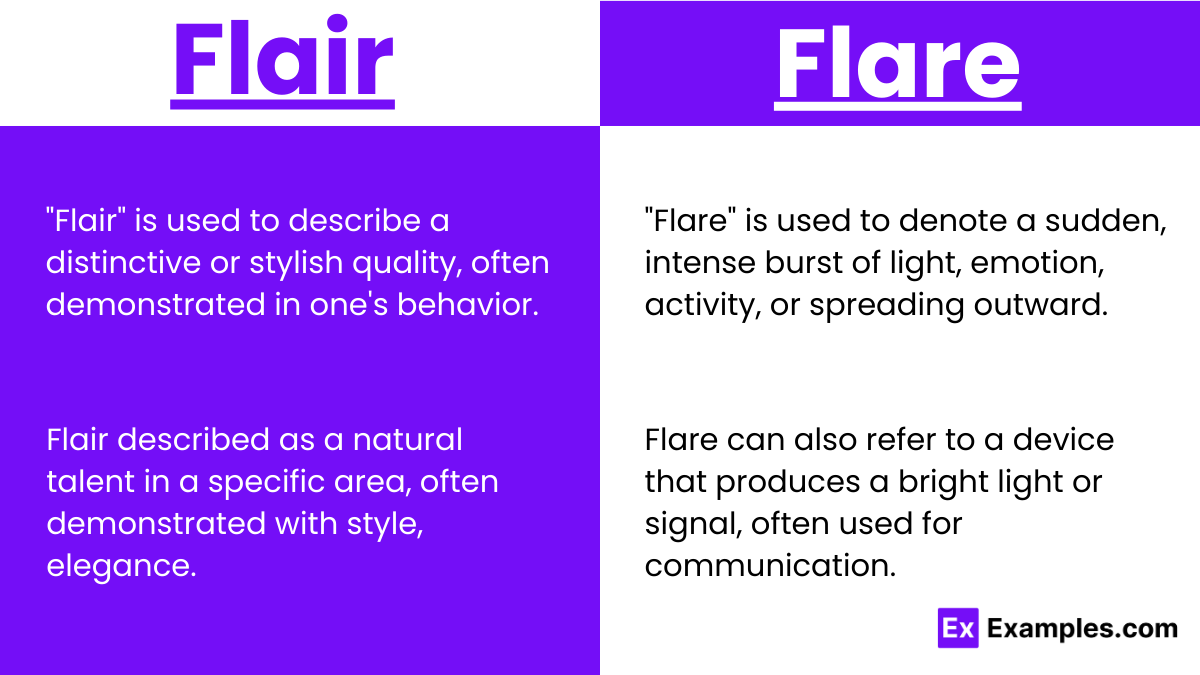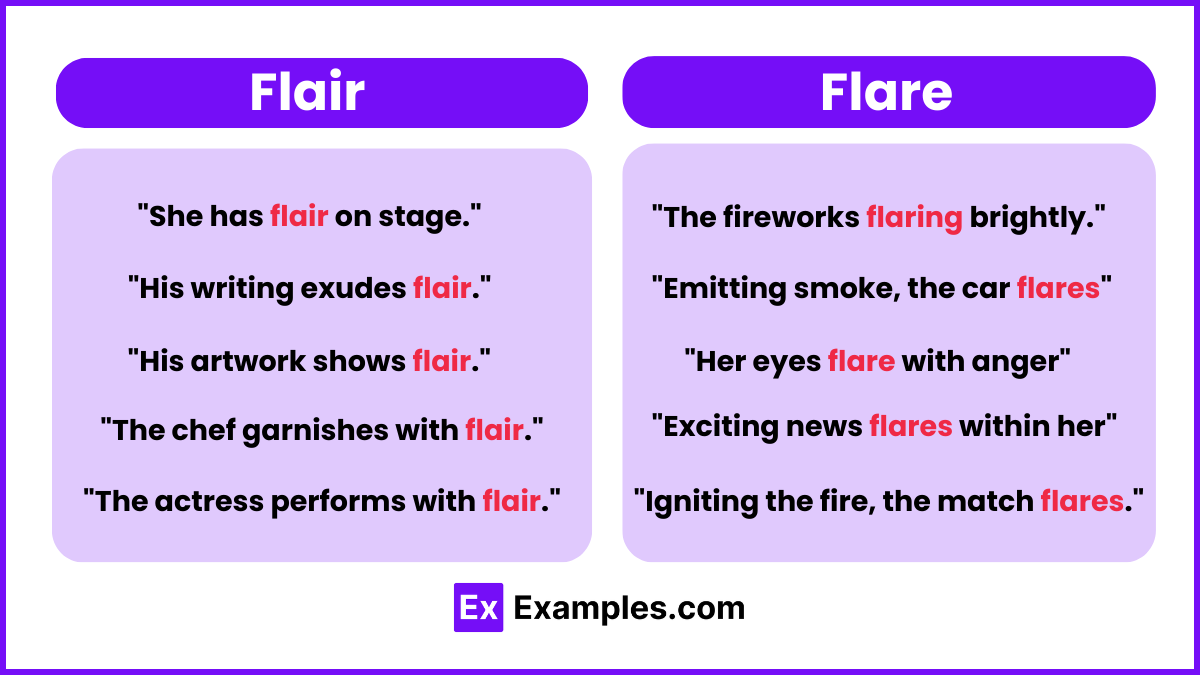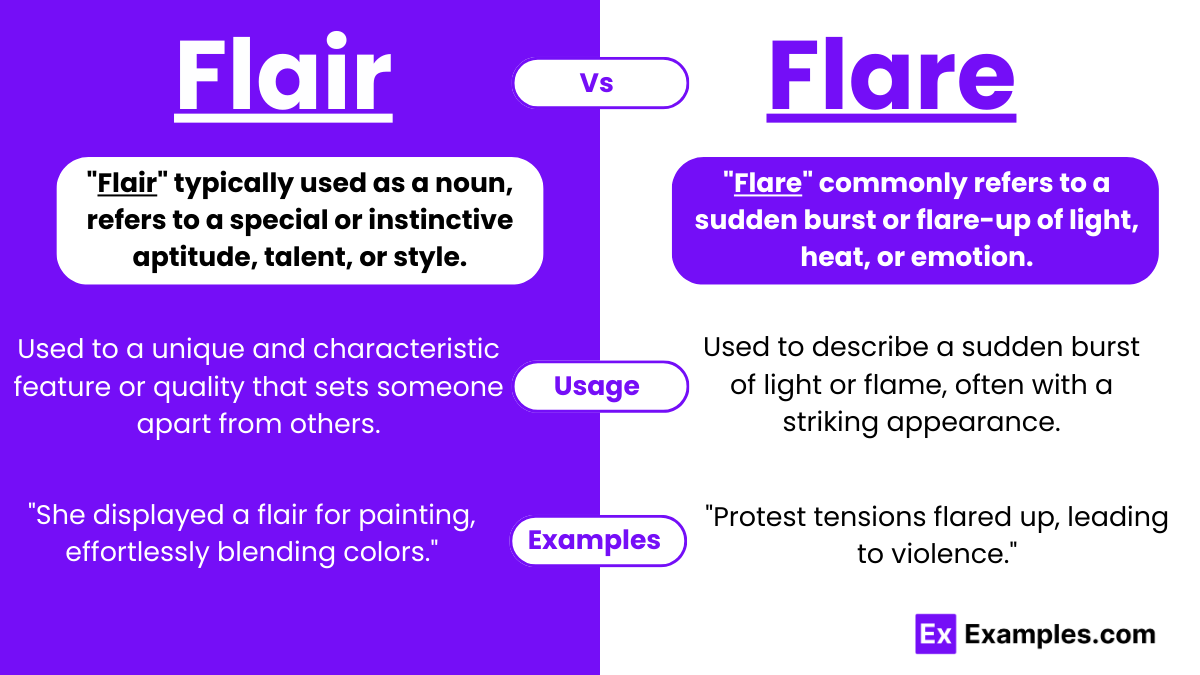Flair vs Flare – Difference, Meanings, Examples, How to use
Words that sound similar or have overlapping meanings can often lead to confusion. One such pair of words that frequently confounds individuals is Flair and Flare. Flair talks about talent or style, while flare usually refers to fire or spreading out. In this comprehensive guide, we’ll explore the disparity between flair and flare, providing clear explanations and examples to help distinguish their usage in everyday language.
Flair and Flare – Meanings
- Flair, typically used as a noun, refers to a special or instinctive aptitude, talent, or style that sets someone or something apart. It embodies a sense of originality, creativity, and finesse. In personal contexts, flair often pertains to individuality and panache, showcasing one’s unique personality or taste.
- Flare typically used as a noun, It commonly refers to a sudden burst or flare-up of light, heat, or emotion. Additionally, flare can denote a signal or display of light used for visibility or communication, as seen in distress flares or road flares. Beyond its literal meaning, flare is also used metaphorically to describe a sudden increase or intensification of something, such as a flare of anger or flare of interest.
Summary
Flair is an abstract noun denoting talent or stylishness, as in a flair for poetry or adding flair to a dress. Flare serves as both a verb and a noun. As a verb, it describes sudden bursts of fire or spreading gradually outward. As a noun, it refers to a burst of flame or a device producing a bright flame, like a signal or for visibility at accident scenes.
How to Pronounce Flair and Flare
- “Flair” is pronounced as /flɛər/, rhyming with “air.”
- “Flare” is pronounced as /flɛər/ when used as a noun (rhyming with “air”) and as /flɛr/ when used as a verb (rhyming with “bear”).
Differences Between Flair and Flare
| Aspect | Flair | Flare |
|---|---|---|
| Style | Unique personal style or elegance | Bright and attention-grabbing |
| Nature | Inherent quality or characteristic | Sudden and intense manifestation |
| Emotion | Often associated with creativity and individuality | Often denotes urgency or excitement |
| Duration | Generally enduring or consistent | Typically brief or fleeting |
| Purpose | Used to express personality or sophistication | Used for signaling or catching attention |
| Association | Linked with talent or skill | Associated with urgency or emergency situations |
| Impact | Adds depth or character | Commands immediate attention or response |
How to Remember the Difference
- Flair: Think of adding “air” to your personal style or presentation. It’s about showcasing your unique qualities or talents, like a breath of fresh air in your expression.
- Flare: Picture a sudden “flare-up” of light, emotion, or activity. It’s a burst of intensity or attention, like a flare illuminating the night sky or a sudden surge of emotion.
Idiom Alerts
“Flare” has some distinct idiomatic uses:
- Flare up: A sudden intensification of a situation or emotion.
Example: “Tensions flared up during the argument, leading to a heated exchange.” - Flare out: The act of widening or spreading outward.
Example: “As she twirled, her dress flared out elegantly, creating a stunning visual effect.” - Flare for the dramatic: A tendency towards drama or theatricality.
Example: “She has a flare for the dramatic, always making grand entrances and exits.” - Flare a nostril: A visible sign of anger or annoyance.
Example: “You could see him flare a nostril in irritation when she interrupted him.” - Flare a temper: The sudden expression of anger.
Example: “He tends to flare his temper when things don’t go his way, often resulting in shouting matches.”
How to Use Flair and Flare

Flair Usage
- Style and Elegance: When someone has a flair, it means they possess a distinctive sense of style and elegance.
- Distinctive Quality or Characteristic: A flair can refer to a unique and characteristic feature or quality that sets someone or something apart from others.
- Skill or Talent: Having a flair for something indicates a natural aptitude or talent in that particular area.
- Decoration or Ornamentation: In this context, flair refers to the decorative elements or embellishments added to something to enhance its appearance or appeal.
- Confidence and Panache: Performing with flair means doing something with confidence, style, and flair.
Flare Usage
- Sudden Burst or Intensity: Flare often refers to a sudden and intense burst of light, flame, or energy. It can describe something that suddenly becomes brighter, hotter, or more pronounced.
- Widening or Spreading Outward: Flare can also indicate a gradual widening or spreading outward of something, such as the bottom of a skirt or the shape of an object.
- Temporary Worsening of Symptoms: Flare can describe a temporary exacerbation or worsening of symptoms, such as pain or inflammation in a medical condition.
- Signal or Beacon: Flare can be used as a signal or beacon, especially in emergency situations or to indicate a specific location.
- Sudden Outburst of Emotion or Activity: Flare can refer to a sudden and intense outburst of emotion, such as anger or excitement, or a sudden increase in activity or intensity.
When to Use
Flair
- Personal Style: Use “flair” when describing someone’s unique and stylish way of doing something, like in fashion or art.
- Talent or Skill: Use “flair” to highlight natural ability or talent in a certain area, such as public speaking or playing an instrument.
- Individuality: Use “flair” to emphasize someone’s unique approach to tasks or situations, adding creativity and originality.
- Decor and Presentation: Use “flair” when referring to decorative touches or stylish enhancements, making something visually appealing, like in interior design or event planning.
- Enthusiasm or Passion: Use “flair” to convey someone’s excitement and dedication, especially in performance or storytelling, captivating an audience with energy and emotions.
Flare
- Visual Distinction: Use “flare” to describe a sudden burst of light or flame, often with a striking appearance, like in fireworks or a camera lens flare.
- Signal or Alert: Use “flare” to refer to a signaling device that emits a bright light, typically used for communication or distress signals, such as a flare gun or a distress flare.
- Medical Condition: Use “flare” to describe a sudden and temporary worsening of symptoms in a medical condition, such as arthritis or asthma, often accompanied by increased pain or discomfort.
- Fashion or Design: Use “flare” to describe a style or design that widens or flares out at the bottom, such as flare jeans or a flare skirt.
- Emotional Expression: Use “flare” metaphorically to describe a sudden display or outburst of emotions, like anger or passion, often intense and brief.
Examples

Flair examples
- She decorated with Parisian flair, using elegant furnishings and artistic accents.
- His cooking had flair for blending unexpected flavors, making each dish an adventure.
- The dancer performed with flair, infusing every movement with grace and emotion.
- She wrote essays with literary flair, captivating readers with vivid imagery.
- The artist’s paintings were characterized by vibrant flair, using bold colors and dynamic brushstrokes.
Flare examples
- The photographer captured a stunning sunset flare over the horizon.
- He used a flare to signal for help when stranded in the wilderness.
- Her asthma symptoms experienced a sudden flare-up during the hike.
- She wore jeans with a slight flare at the bottom for a retro look.
- His temper flared when he heard the news about the project delay.
Synonyms
| Flair | Flare |
|---|---|
| Talent | Blaze |
| Skill | Burst |
| Style | Flash |
| Gift | Outburst |
Exercise
- She has a natural ____ for interior design.
- The sudden ____ of light in the sky startled everyone.
- His writing style has a unique ____ that captivates readers.
- The fireworks created a spectacular ____ against the dark night sky.
- She wore a colorful scarf to add a touch of ____ to her outfit.
Answers
- flair
- flare
- flair
- flare
- flair
FAQ’S
What is the difference between flair and flare?
Flair refers to a talent or style, while flare denotes a sudden burst of light or emotion, often used metaphorically for escalation or eruption.
What does it mean to have a flair?
Having a flair signifies possessing a natural talent, knack, or distinctive style in a particular activity, such as art, design, or performance.
What does flair it mean?
Flair denotes innate skill, talent, or stylishness in performing tasks or activities, often characterized by creativity, elegance, or originality.
What does having a flare mean?
Having a flare signifies experiencing a sudden outburst of emotion, light, or activity, commonly associated with intensity, urgency, or escalation.
Is it flair or flare for something?
When referring to talent, style, or skill, it’s “flair” (e.g., artistic flair). When indicating a sudden burst or escalation, it’s “flare” (e.g., flare-up in tension).



